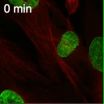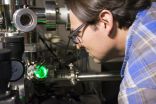Producing biodegradable plastic just got cheaper and greener
2015-07-06
(Press-News.org) Biodegradable drinking cups or vegetable wrapping foil: the bioplastic known as polylactic acid (PLA) is already a part of our everyday lives. And yet, PLA is not yet considered a full alternative to traditional petroleum-based plastics, as it is costly to produce. Researchers from the KU Leuven Centre for Surface Chemistry and Catalysis now present a way to make the PLA production process more simple and waste-free. Their findings were published in Science.
The bioplastic PLA is derived from renewable resources, including the sugar in maize and sugarcane. Fermentation turns the sugar into lactic acid, which in turn is a building block for polylactic acid. PLA degrades after a number of years in certain environments. If it is collected and sorted correctly, it is both industrially compostable and recyclable. In addition, PLA is biocompatible and thus suitable for medical use, for instance in absorbable suture threads. PLA is also one of the few plastics that are suitable for 3D printing.
However, PLA is not yet a full alternative for petroleum-based plastics due to its cost. The production process for PLA is expensive because of the intermediary steps. "First, lactic acid is fed into a reactor and converted into a type of pre-plastic under high temperature and in a vacuum", Professor Bert Sels explains. "This is an expensive process. The pre-plastic - a low-quality plastic - is then broken down into building blocks for PLA. In other words, you are first producing an inferior plastic before you end up with a high-quality plastic. And even though PLA is considered a green plastic, the various intermediary steps in the production process still require metals and produce waste."
The KU Leuven researchers developed a new technique. "We have applied a petrochemical concept to biomass", says postdoctoral researcher Michiel Dusselier. "We speed up and guide the chemical process in the reactor with a zeolite as a catalyst. Zeolites are porous minerals. By selecting a specific type on the basis of its pore shape, we were able to convert lactic acid directly into the building blocks for PLA without making the larger by-products that do not fit into the zeolite pores. Our new method has several advantages compared to the traditional technique: we produce more PLA with less waste and without using metals. In addition, the production process is cheaper, because we can skip a step".
Professor Sels is confident that the new technology will soon take hold. "The KU Leuven patent on our discovery was recently sold to a chemical company that intends to apply the production process on an industrial scale. Of course, PLA will never fully replace petroleum-based plastics. For one thing, some objects, such as toilet drain pipes, are not meant to be biodegradable. And it is not our intention to promote disposable plastic. But products made of PLA can now become cheaper and greener. Our method is a great example of how the chemical industry and biotechnology can join forces".
INFORMATION:
Media contacts
Professor Bert Sels, KU Leuven Faculty of Bioscience Engineering (Centre for Surface Chemistry and Catalysis), tel: +32 32 15 93, e-mail: bert.sels@biw.kuleuven.be
Dr Michiel Dusselier, KU Leuven Faculty of Bioscience Engineering (Centre for Surface Chemistry and Catalysis) and California Institute of Technology, tel: +32 37 67 06, e-mail: michiel.dusselier@biw.kuleuven.be
Full text
The full text of the study "Shape-selective zeolite catalysis for bioplastics production" by Michiel Dusselier, Pieter Van Woude, Annelies Dewaele, Pierre Jacobs, and Berts Sels was published in Science (DOI: 10.1126/science.aaa7169). Copies can also be obtained from the authors.
ELSE PRESS RELEASES FROM THIS DATE:
2015-07-06
A protein dubbed 'Bcl-Rambo' can protect against heart failure, suggests new research from King's College London and funded by the British Heart Foundation (BHF).
The Bcl-Rambo protein (also known as Bcl2-L-13) was named by a Japanese scientist because it was thought to be involved in activating cell death - 'Rambo' also means violence in Japanese. However, it seems that the Rambo movie character's protein counterpart has actually been misjudged. New research shows for the first time that the Bcl-Rambo protein may not be so violent after all and is actually involved in ...
2015-07-06
Iron-nickel alloys are ubiquitous: they are found at the earth's core and in meteorites. What is fascinating about such alloys is that their inner structure can change with rapid temperature swings. Heated up above 730 °C (1,340 °F), these alloys enter what is referred to as an austenitic phase. Alternatively, they can be turned into very hard alloys, referred to as a martensitic phase, by subjecting them to extremely rapid cooling. Now a team of scientists from Germany has, for the first time, created a large-scale simulation involving 275,000 atoms representing ...
2015-07-06
Researchers at the University of Adelaide have discovered a new method for culturing stem cells which sees the highly therapeutic cells grow faster and stronger.
The research, which was published in the prestigious international journal, Stem Cells, is expected to eventually lead to new treatments for transplant patients.
Kisha Sivanathan, a PhD student in the University of Adelaide's School of Medicine and the Renal Transplant Unit at the Royal Adelaide Hospital, says this is an exciting breakthrough in stem cell research.
"Adult mesenchymal stem cells, which ...
2015-07-06
A study of 311 patients by The University of Manchester has found that it may be possible to predict early which rheumatoid arthritis (RA) patients will fail to respond to the biologic drugs given to treat them. These findings could help better manage patients' symptoms.
RA is a chronic disease which affects up to 1.5% of the population. It is a significant health burden for patients, who can experience pain, reduced mobility and premature death unless they receive effective treatment.
Biologics are a relatively new form of treatment for RA. Given by injection, ...
2015-07-06
Pursuant to the Act on the Reform of the Market for Medicinal Products (AMNOG), the German Institute for Quality and Efficiency in Health Care (IQWiG) reassessed fingolimod (trade name: Gilenya), a drug for the treatment of adults with highly active relapsing remitting multiple sclerosis (RRMS). The Federal Joint Committee (G-BA) had limited its decision on the first assessment from 2012 to three years because it considered the certainty of the data as insufficient. This obliged the drug manufacturer to submit a second dossier.
It did not submit any new studies, but reanalysed ...
2015-07-06
Scientists believe that a simple two-hour emotional awareness course aimed at making young offenders less aggressive could hold the key to significantly reducing the seriousness of their future crimes.
In the first ever study of its kind, psychologists from Cardiff University recorded a 44% drop in the severity of crimes committed by persistent reoffenders, six months following the completion of a course designed to improve their ability to recognise other people's emotions. The findings are published today in PLOS ONE journal.
Much has been published previously to ...
2015-07-06
ITHACA, N.Y. - To protect consumers from foodborne illness, produce farmers should wait 24 hours after a rain or irrigating their fields to harvest crops, according to new research published in the journal Applied and Environmental Microbiology.
Rain or irrigation creates soil conditions that are more hospitable to Listeria monocytogenes, which when ingested may cause the human illness Listeriosis. Waiting to harvest crops reduces the risk of exposure to the pathogen, which could land on fresh produce.
Cornell scientists, along with other agricultural researchers from ...
2015-07-06
Astronomers have found evidence for a large population of hidden supermassive black holes in the Universe.
Using NASA's Nuclear Spectroscopic Telescope Array (NuSTAR) satellite observatory, the team of international scientists detected the high-energy x-rays from five supermassive black holes previously clouded from direct view by dust and gas.
The research, led by astronomers at Durham University, UK, supports the theory that potentially millions more supermassive black holes exist in the Universe, but are hidden from view.
The findings are being presented at the ...
2015-07-06
For cell division to be successful, pairs of chromosomes have to line up just right before being swept into their new cells, like the opening of a theater curtain. They accomplish this feat in part thanks to structures called centrioles that provide an anchor for the curtain's ropes. Researchers at Johns Hopkins recently learned that most cells will not divide without centrioles, and they found out why: A protein called p53, already known to prevent cell division for other reasons, also monitors centriole numbers to prevent potentially disastrous cell divisions.
Details ...
2015-07-06
Richland, Wash. -- Despite decades of industrial use, the exact chemical transformations occurring within zeolites, a common material used in the conversion of oil to gasoline, remain poorly understood. Now scientists have found a way to locate--with atomic precision--spots within the material where chemical reactions take place, and how these spots shut down.
Called active sites, the spots help rip apart and rearrange molecules as they pass through nanometer-sized channels, like an assembly line in a factory. A process called steaming causes these active sites to cluster, ...
LAST 30 PRESS RELEASES:
[Press-News.org] Producing biodegradable plastic just got cheaper and greener


